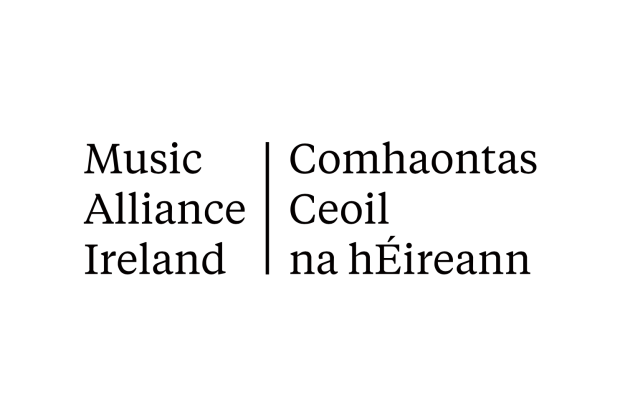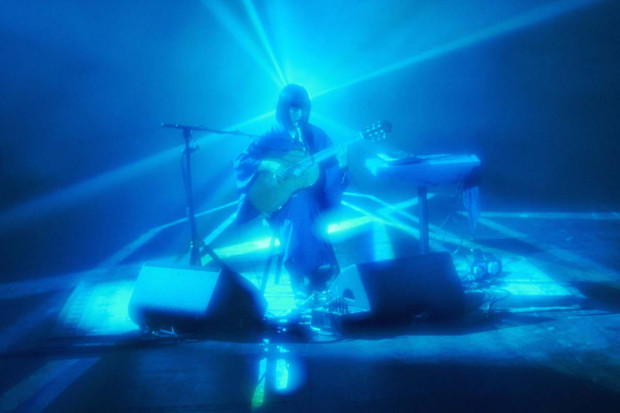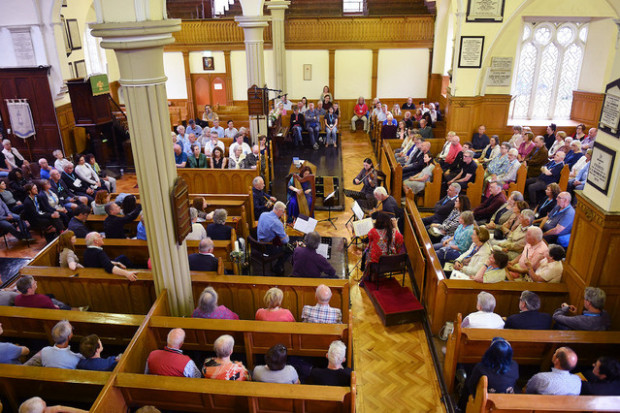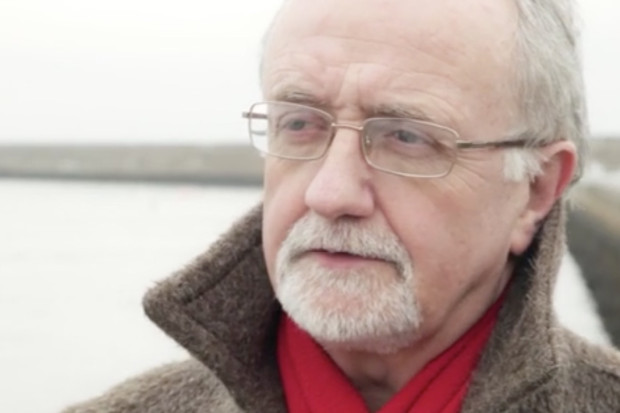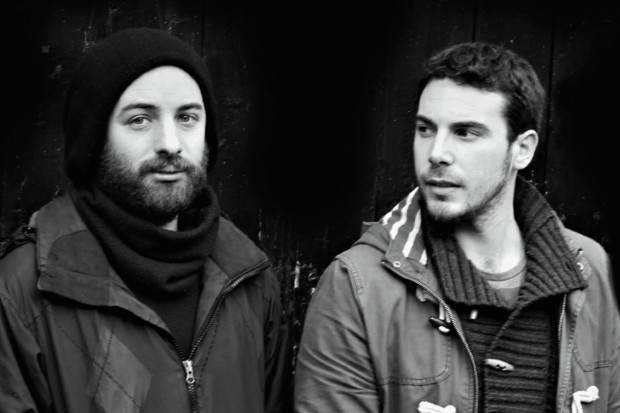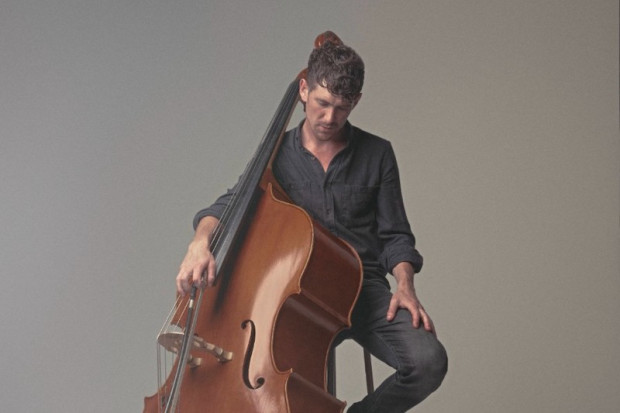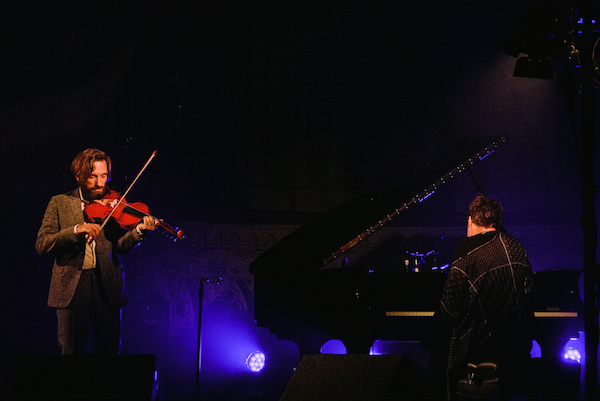
Caoimhín Ó Raghallaigh and Thomas Bartlett performing at Sounds from a Safe Harbour (Photo: Marion Solheim)
Art Makes Such Things Possible
‘Always different, always the same’ was an oft-quoted adage whenever the subject of the great British post-punk institution The Fall was raised. Three editions in, and it seems like the same can be said of Sounds from a Safe Harbour (10–15 September), the biennial event located by the Lee in Cork. Three different line-ups can’t hide a feeling of familiarity. Indeed, the latest iteration saw a host of names who have played at least one of the previous events.
However, as a festival based on a bedrock of collaboration and a spirit of innovation, there has (unlike The Fall!) yet to be the merest hint of repetition. It’s a festival that feels deeply embedded in Cork. An internationally facing event with strong local support it reaches a broad range of people despite the perceived niche nature of some of the musical projects. It was after the festival finale, a tribute to the Mexican-American singer-songwriter Lhasa de Sela, that a musician friend put his finger on the festival’s unique appeal. ‘The closest thing,’ he declared, ‘is a Fleadh Cheoil.’
It’s an astute observation. What other contemporary or popular music festival sees performers hang around a town for a number of days and play with other performers? The sense that this was something both novel and liberating for the performers was palpable in Leslie Feist’s declaration of gratitude towards the festival at the climax of the Lhasa concert. In town since at least Friday, the Canadian singer had already headlined at the Cork Opera House the night before and participated in the Homeric-themed Odyssey project alongside Shahzad Ismaily and Todd Dahlhoff.
You could call it a community rather than a festival or line-up, and this vibrant component has been present in Sounds from a Harbour since its inaugural event, fostering a climate of cross-pollination. It’s also quite an omnivorous beast.
Sadness and beauty
Situated on the Cork City festival calendar between the Ocean to City maritime festival and the Cork Midsummer arts festival on one side, and the Cork Folk Festival and Jazz Festival on the other, a Venn diagram would see plenty of areas of overlap between all four with Sounds from a Safe Harbour located at the centre, and even that diverse feast doesn’t quite capture its scope of interest.
It’s an event that contextualises and re-contextualises an artist within the same festival. Finnish-Irish trio Slow Moving Clouds have been defying description with a baroque sound that combines elements of Nordic and Irish folk music with minimalist composition, but in creating the score for Dingle-based dance company Teaċ Daṁsa’s Swan Lake / Loch na hEala they have exposed their magical sound to a broader audience. This much-anticipated theatrical event served as a curtain raiser for this year’s festival, and, in its staging, acting and Michael Keegan-Dolan’s choreography, it did not disappoint, becoming a word of mouth success. Taking as its source the story of the Children of Lir, Swan Lake / Loch na hEala tells a tale that speaks directly to contemporary Ireland, one that highlights the sadness that exists at the core as much as the poetic beauty and black humour.
Once witnessed it is hard to listen to pieces on the soundtrack album like the foreboding opening track ‘Karelian’ without recalling the lithe trio of mysterious dancers whose terrifyingly elegant dispatching of the brutish and debased figure played by the incomparable Mikel Murfi is carried out with exceptional grace. Equally so, it’s now difficult to hear the percussive closing track ‘Swansong / Starfall’ without feeling the tingling caress of a million snowflakey feathers.
There’s little doubt that most of the crowd at a packed Crane Lane Theatre venue on Sunday afternoon for a free performance by Slow Moving Clouds were recent converts, there to relive those very feelings. Having had Mary Barnecutt deputise for him during Loch na hEala’s run, cellist Kevin Murphy returned for this gig. Finnish nickel-harp player Aki assured the audience there would be no appearance of feathers this time when he introduced ‘Swansong / Starfall’ as the final song of their set but they had already weaved a spell over the audience with numbers like ‘Under The City’, its staccato strings the sound of a bracing sleigh-ride and cellist Murphy’s delicate falsetto the frosty breeze at our ears.

Slow Moving Clouds at Crane Lane Theatre (Photo: Itchy Feet Creative)
Powerful reminder
Theatre and dance weren’t the only artistic disciplines outside of music represented at the festival. Visual art and video pieces have also found a berth here but this year featured a significant development in the shape of Heartship, an ambitious project initiated by one of the country’s leading conceptual thinkers, artist Dorothy Cross. Thursday saw the unveiling of the Heartship film, a 15-minute piece shot by acclaimed filmmaker Alan Gilsenan, featuring festival regular Lisa Hannigan and one of the Irish naval ships. Soundtracking the experience is Hannigan’s dulcet tones and the otherworldly tones of a glass armonica, played by Alasdair Malloy.
Also on board the ship is a human heart that was originally discovered in the walls of the crypt of Cork’s Christchurch, encased in a lead casing. The object ended up in Pitt Rivers Museum in Oxford and for this project it has been allowed to make a sort of homecoming.
There’s no denying that the sight of the LE James Joyce’s arrival at the docks of the port of Cork, heralded by those celestial sounds, was a moving one. Perched up on deck was Hannigan, an aluminium foil insulation blanket draped around her, reminding us of the thousands of refugees rescued by the Irish Navy in the Mediterranean sea.
If it was an actual boat full of refugees there would be a diverse and perhaps conflicting range of responses but amongst the throng who had assembled on the quay to greet the ship there was an overwhelming and shared sense of hushed awe. It was a powerful reminder that art makes such things possible.
Before the heart was brought ashore, and after a protracted period of waiting for the ship to dock, Hannigan appeared port side and, both solo and accompanied by a violinist, sang a number of songs from the English folk tradition that conveyed the theme of lovers at sea, such as ‘Blow the Wind Southerly’ and ‘The Grey Funnel Line’. It could be said that the choice of ‘My Bonnie Lies Over the Ocean’ was a rather facile one given the subject relates more to eighteenth-century English politics.
What is not in dispute is Hannigan’s angelic voice and the singer ended her set with a very pertinent and appropriate rendition of her song ‘Prayer for the Dying’, a song that was hatched and premiered at the very first Sounds from a Safe Harbour in 2015 when she and festival co-curator Aaron Dessner, a member of cerebral indie rockers The National, collaborated on her At Swim album.

Lisa Hannigan in Heartship (Photo: Bríd O’Donovan)
Meeting of worlds
Earlier that afternoon, Crash Ensemble celebrated the launch of their Crashlands album in the Kino. The album sprung from their twentieth anniversary celebrations in 2017, which saw them present twenty pieces over the course of playing ten off-the-beaten-track venues, one of which took place at the last Sounds from a Safe Harbour.
The launch presented quite a contrast in styles. First the band opened with a composition by emerging Cork composer Sam Perkin and saw an unexpected and unusual meeting of worlds as young local skateboarders were in attendance to see the ensemble score Grey Area to a moody skateboarding video. Perkin is an enthusiastic skater and the piece makes a couple of furtive nods to more contemporary rock gestures.
In contrast, the two other pieces they played allowed them to show a more humorous side. Ed Bennett’s Accel… sounded like a dark fairytale, a secret march of magical creatures with Roddy O’Keeffe’s woozy trombone plodding ogre-like in their wake. By the end, O’Keeffe is alternating between gruff high and plaintive low pitches, sounding like a cartoon telephone conversation between drunks. On Terry Riley’s Loops for Ancient-Giant-Nude-Hairy-Warriors Racing Down the Slopes of Battle, the strings were a seedy tango, dangerous and sharp, while the guitar was an elegantly frayed Lothario strutting out on to the floor.

Crash Ensemble at Kino (Photo: Marion Solheim)
Embers
Crash Ensemble weren’t the only artists celebrating the release of an album. The Gloaming’s Caoimhín Ó Raghallaigh and Thomas Bartlett unveiled their self-titled long player at St Luke’s Church as the evening light began to slip away through the building’s stained-glass windows. The church has an unusual shape, more cube-like and spacious than is the norm, and Ó Raghallaigh and Bartlett were in a mood to explore its particular resonances and did so with little hurry.
In the engulfing gloom the pair kindled the tunes like frail embers, teasing and testing them until they felt unrecognisable. Was that ‘Further Than Memory’ that Ó Raghallaigh transformed, his wrist like a high-wire unicyclist teetering back and forth with such an ever-increasing sense of exertion until it felt like it was about to crash spectacularly. Other songs like ‘Open Shelter’ and ‘Kestrel’ were more faithful to their recorded versions.
Staggered raindrop sounds
Another previous visitor to Sounds from a Safe Harbour is Sam Amidon. Accompanied by festival guests Todd Dahlhoff and multi-instrumentalist and composer Shahzad Ismaily at St Luke’s, the idiosyncratic folk music interpreter played a selection of songs from the songbook of the Harry Smith folk anthology. The group’s presence served to emphasise the more rock ‘n’ roll aspects of the songs. Even so, it was the set’s more mellow moments which enraptured. Amidon may be better known for his sometimes edgy approach to the fiddle or banjo but on certain songs his voice recalls James Taylor. From his tone alone on ‘Fatal Flower Garden’ you’d imagine Amidon was detailing a fondly remembered romance but the lazy sense of unconcern softens the appalling horror at its heart. It’s a cautionary tale warning young children against venturing on to someone’s property to retrieve a misplaced ball.
It’s raining in the song, and in the spare, gently plucked guitars and decreasing strummed triads you can practically hear those staggered raindrop sounds that still fall from trees and outcrops long after the shower has passed. ‘The Spanish Merchant’s Daughter’ saw them joined by Thomas Bartlett, the shimmering notes at the end like sprinkled stardust from the apse above.
Amidon’s facility for delivering the unexpected is a source of deadpan humour. While explaining in his own inimitable way the origins of shape-note singing, Amidon acknowledges the strength of the tradition in Cork. The last thing expected at this point is for Ismaily to crank up his guitar like Jimi Hendrix launching into the ‘Star Spangled Banner’. The song in question, ‘Cusetta’, soon gave way to a more gentle style but the next track, a fiddle song, saw Ismaily stand up from behind the drums to play his electric bass upright, while Dahlhoff played a bow across his guitar. It’s a raucous number. Against the pulsating, undulating bass Amidon’s yowling sounds are like the whistle of a distant train, a result of his vocal being sampled by and fed back through the guitar. ‘I will tell you right now,’ he said straight-faced, ‘our rendition of that song is not so different from the original as one might expect.’
His set was one of the highlights of a weekend of high points. And in that moment Sounds from a Safe Harbour once again demonstrated how the same thing can always sound different.

Sam Amidon at St Luke’s (Photo: Marion Solheim)
Sounds from a Safe Harbour is curated by Bryce and Aaron Dessner, Cillian Murphy, Enda Walsh and Mary Hickson. Visit http://soundsfromasafeharbour.com.
Published on 25 September 2019
Don O'Mahony is a freelance arts journalist based in Cork.










